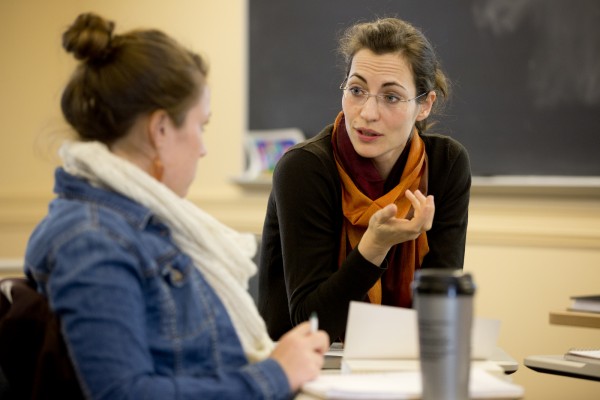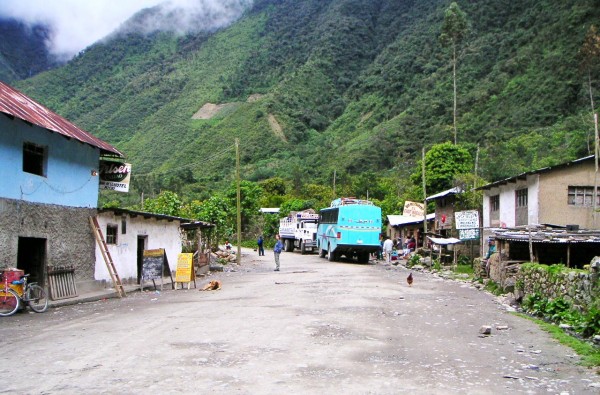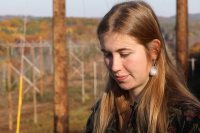
Recent tenure appointee Sonja Pieck explores “the nexus of power and nature”
What is nature, who gets to decide its fate and why? And how can those who are excluded from environmental governance get some say?

Pieck says her undergraduate professors “changed the way I understood the world.” She strives to have similar impact with her students. Photograph by Phyllis Graber Jensen/Bates College.
Sonja K. Pieck, a member of the Bates environmental studies faculty since 2007, addresses those questions in her courses and through research here and abroad, particularly in South America.
Her work in the classroom — which two years ago brought her a Bates Kroepsch Award for outstanding teaching — and in the field has led to her recent promotion to the position of associate professor of environmental studies, with tenure, effective Aug.1.
Growing up a citizen of the world
Daughter of a German diplomat, Pieck got to explore the world early as her family migrated between her father’s various postings. Before she entered college she had lived in Algeria, Germany, Israel, Ecuador and several U.S. locations, including Boston and Washington, D.C.
Along the way, she became interested in the question, “Why do places look so different?” She said her family’s environmental consciousness also led her to ask, for example, “how decisions made in Washington and New York translate into environmental changes at particular times, in particular places and for particular groups of people.”
Pieck majored in environmental studies at Bucknell University, then earned a master’s degree and a doctorate in geography at Clark University before taking a postdoctoral fellowship at the University of Chicago.
Today, Pieck studies transnational activism, nongovernmental organizations, indigenous movements and debates around environmental governance, with a focus on the Andean and Amazonian regions of South America.
She has taught a range of courses examining environmental problems and politics from various social science perspectives and shares teaching responsibility for “Community-Engaged Research in Environmental Studies,” the capstone course for the major.
Pieck has also had a leading role in the development of a new program and major in Latin American Studies, to begin in fall 2013. “This major speaks to not only the influence the rest of world has had on the region, but the region’s influence on the world, especially the U.S. We are seeing a much more profound impact of Latin American cultures and populations in the U.S. and that’s very exciting.”
Studying nature and human nature
Pieck says, “I’ve always been interested in the multiple meanings that nature has for people and how those meanings become sources of people’s identity — their hopes and their antagonisms among each other. How do people identify with particular places and forms of nature, and how do they negotiate the changing forms of nature?
“My other set of interests is around forms of political participation related to nature, especially the politics around access to nature and natural resources.”
In short, Pieck said, “I look at the nexus of power and nature. Political participation is a question of meaning-making. That’s why I’m also so interested in social movements and NGOs, because they are ways in which people are trying to participate or trying to make claims on nature.”
Why focus on South America? She explained, “South America has some of the world’s most evocative forms of nature,” which have also become flashpoints for conflicting economic and environmental interests.
“When you build an asphalt highway in the middle of a rainforest, it has enormous environmental and social ripple effects.”
Her current research focus, the Interoceanic Highway, is a prime example of struggles triggered by competing desires for rapid economic progress, a healthy environment and a just social order.
The project to build a highway between Brazil and Peru — “running through the rainforest, then snaking up over the Andes mountains and back down to the Peruvian coast” — was initiated by the two countries to provide a trade outlet to the Pacific for the commodities that are fueling their booming economies: natural gas, oil and timber plus minerals including copper, zinc and gold.

Over 1,500 miles of roadway from Brazil to Peru, such as this stretch between Puerto Maldonado and Cusco in Peru, photographed in 2004, have been paved and modernized as part of the Interoceanic Highway project. Photograph by Patrick Nouhailler.
“As studies across the world have shown,” Pieck says, “when you build an asphalt highway in the middle of a rainforest, it has enormous environmental and social ripple effects.” These include creeping deforestation, sedimentation of rivers, internal mass migration and increased illegal activity such as the drug trade and human trafficking. The case of the Interoceanic Highway is complicated by the fact that important national parks and indigenous reserves sit nearby.
But South America, and in fact Latin America more broadly, also presents what Pieck calls “really creative thinking about how you resolve some of these conflicts.”
Pieck pointed out that the tradition of collective action and social movements is very strong in much of the region, with such movements changing the face of government in Ecuador and Bolivia, for instance; and that the kinds of participatory, democratic and earth-oriented alternatives articulated by the Landless Movement in Brazil or the Zapatistas in southern Mexico have had global echoes as well.
“All in all, Latin America is a fascinating region for the study of contested nature,” she said.
Teaching and learning at Bates
As an undergraduate at another small, private, residential liberal arts college, Pieck found she greatly enjoyed the strong sense of community and close interaction between students and faculty.
“It was in college that I finally learned how to make sense of the environmental conflicts I had witnessed growing up,” she said. “My professors fundamentally changed the way I understood the world. It was the first time I thought about the crucially important role faculty could play in the lives of their students. I want to make that kind of impact on my own students.”
Spring is when Bates seniors complete their required theses — a time of year when Pieck gets a particularly strong opportunity to have impact with some of those students. She has supervised more than 30 thesis students.
“The most challenging part — and I think students would agree with me — is to find the right kind of question: one that is interesting, one that you care about answering, one that is going to lead you to some original conclusion. And, on top of that, one that you can address adequately in a semester or two. That’s a tall order.
“Negotiating the complexity of the world in their work.”
“Once they have found that question — often with my guidance, sometimes without — that’s a sweet moment. The wheel stops spinning, they find the traction and they go! They come up with great papers, great theses, and I learn new things about topics that I might never have gotten to on my own.
“For instance, I’ve worked with a student who did a thesis on the history of nuclear power in Armenia. Last year I had an honors student doing work on environmental NGOs in Ecuador. And I’m currently advising a student doing a thesis on the history of environmental activism in Lewiston.
“It’s very inspiring to see students deeply involved in crafting their own intellectual argument and negotiating the complexity of the world in their work.”
Pieck’s current course “Environmental Justice in the Americas” represents her broader interests as well as interests she’d like to encourage at Bates.
“I’m hoping in future years to get students involved [through the course] in related projects on campus and potentially off campus, and get us all to think more broadly about how environmental justice actually touches us on campus. I think there are much larger questions involved about meaning and participation, about the right to a healthy environment, a healthy life.
“There are larger tasks connected with that course that I am excited about and that I think are important for the campus community.”




